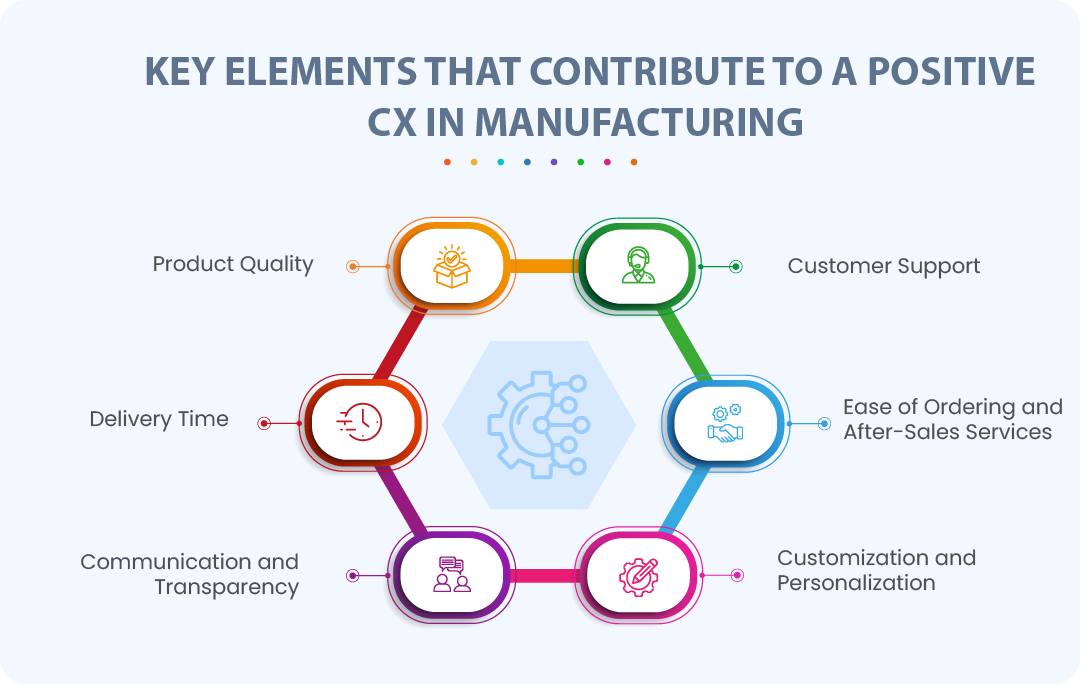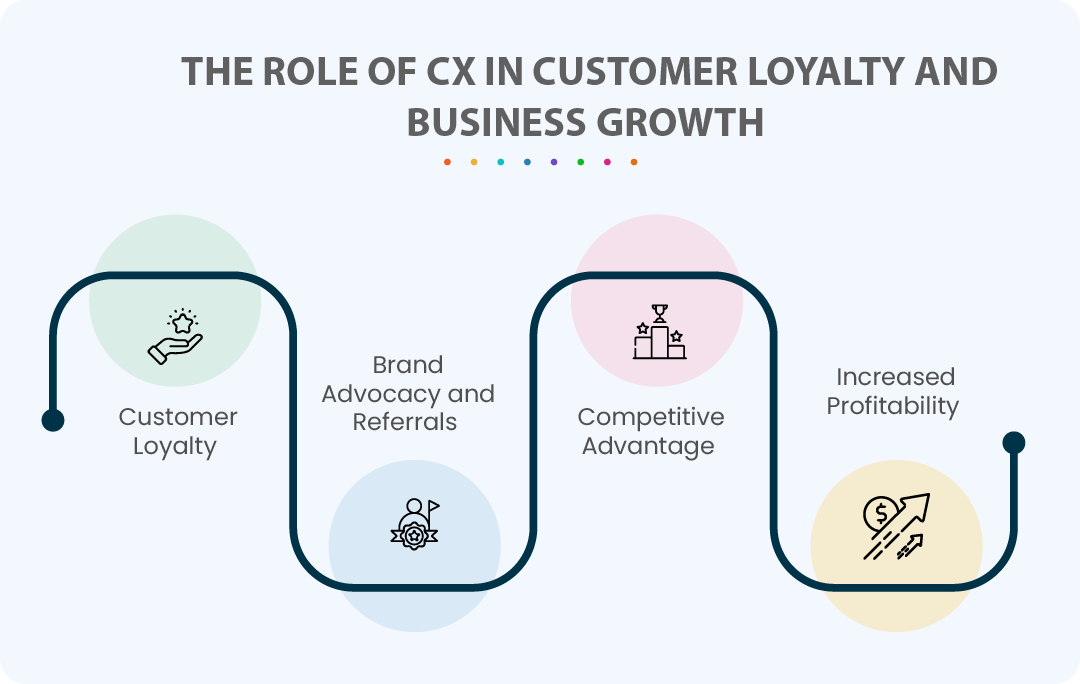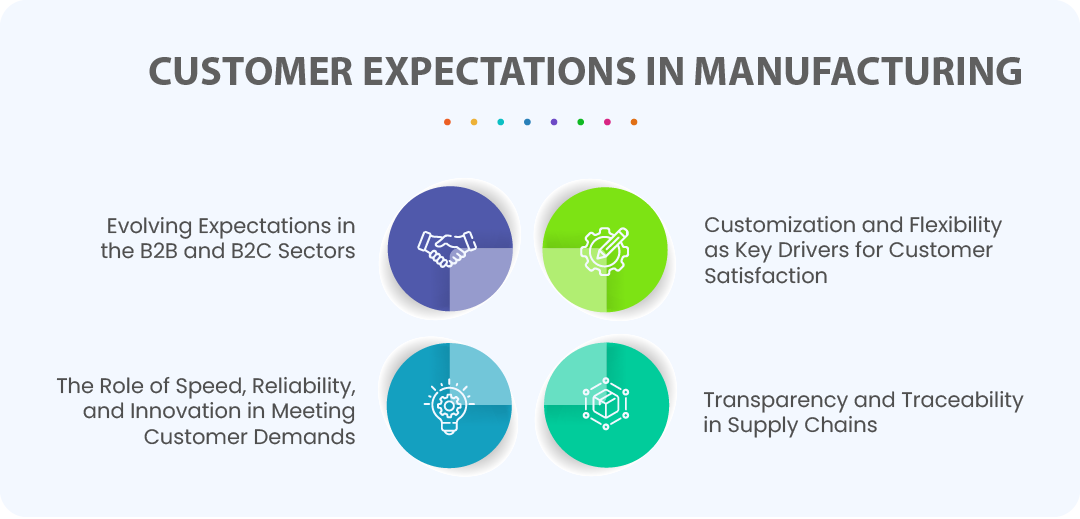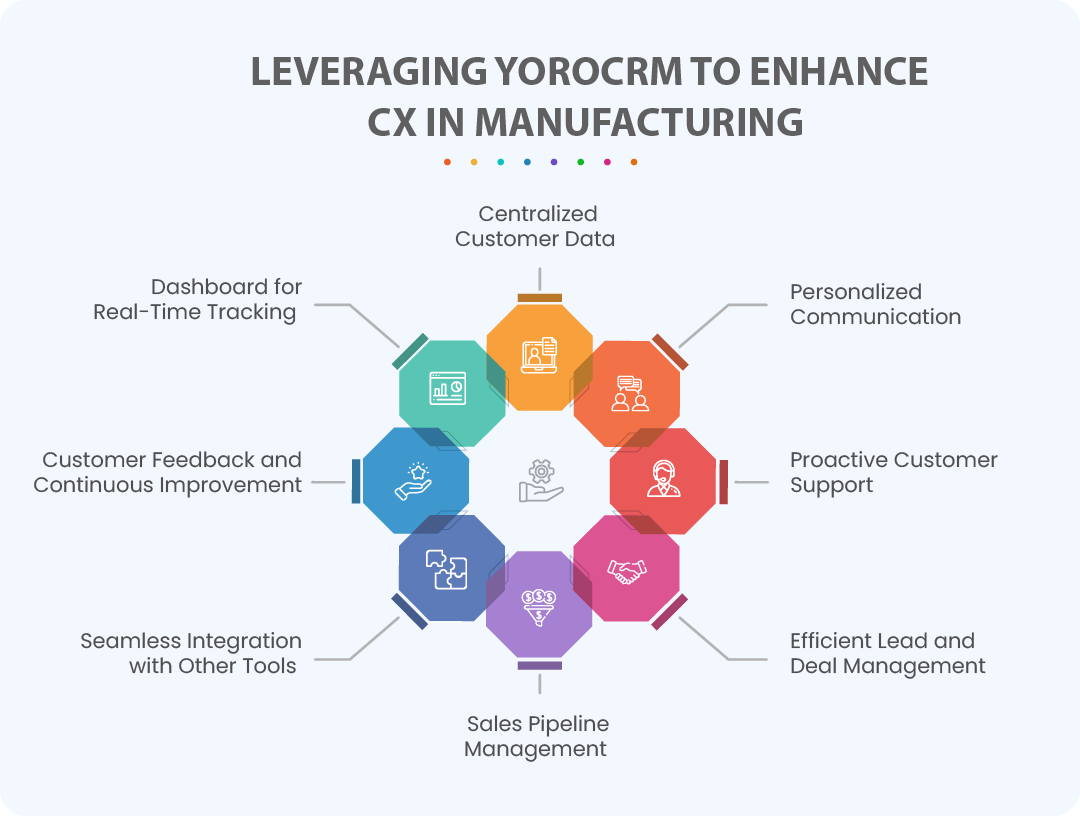Let's see the glimpse below,
- Introduction
- Understanding Customer Experience in Manufacturing
- Key Elements that Contribute to a Positive CX in Manufacturing
- Current Trends in the Manufacturing Industry
- Customer Expectations in Manufacturing
- The Role of Technology in Enhancing CX
- Best Practices for Improving CX in Manufacturing
- Measuring and Optimizing CX Performance in Manufacturing
- Leveraging YoroCRM to Enhance CX in Manufacturing
- Conclusion: Enhancing CX with YoroCRM in Manufacturing
Introduction
In the manufacturing sector, the importance of Customer Experience (CX) has become increasingly undeniable. As markets become more competitive and customer expectations continue to rise, manufacturers can no longer rely solely on product quality or price to drive business success. Instead, providing a superior customer experience is now a key differentiator that can influence customer loyalty, enhance brand reputation, and drive long-term profitability. In this ever-evolving landscape, customers expect personalized, seamless, and responsive experiences that span the entire lifecycle—from product design and manufacturing to post-sale support.
Manufacturing is no longer just about producing goods; it’s about creating value at every touchpoint of the customer’s journey. Whether it’s through efficient supply chains, high-quality products, real-time communication, or strong after-sales service, a positive customer experience is vital for maintaining a competitive edge and ensuring customer satisfaction. The industry is witnessing a profound shift, as digital transformation, automation, and emerging technologies are reshaping how manufacturers engage with their customers. In fact, a report by McKinsey & Company found that 70% of the customer's journey is influenced by how companies engage with their customers, highlighting the importance of seamless, omnichannel experiences in gaining a competitive advantage.
However, with these opportunities come challenges. Manufacturers must overcome operational inefficiencies, meet the rising demand for sustainability, and address the complexities of customer expectations in an increasingly global and digital marketplace. According to a PwC study, 73% of consumers say that CX is an important factor in their purchasing decisions, and 42% of them will stop doing business with a company after just one poor experience. This statistic underscores the high stakes involved in delivering exceptional CX.
The ability to deliver an exceptional customer experience in the manufacturing industry requires companies to adopt innovative strategies, leverage advanced technologies, and continuously enhance their processes to keep up with evolving customer needs. In a Forrester report, 60% of companies stated that they were actively investing in digital transformation initiatives to improve customer experience.
Understanding Customer Experience in Manufacturing
In the context of manufacturing, Customer Experience (CX) refers to the cumulative impact of all interactions a customer has with a company across its entire lifecycle, from initial contact and purchase to post-sale support and product use. It encompasses the way a customer perceives the company, its products, and services based on their experiences. CX in manufacturing extends beyond the physical product itself to include factors such as ordering, delivery, customer service, and even the ease of accessing support for product issues or concerns.
Manufacturers today are increasingly recognizing that CX is not just about producing high-quality goods. It involves creating an end-to-end experience that meets customer expectations at every touchpoint. In this competitive, experience-driven economy, companies that deliver superior CX often stand out and differentiate themselves from competitors, driving customer satisfaction, loyalty, and long-term business success.
Key Elements that Contribute to a Positive CX in Manufacturing
Several key elements influence how customers perceive their experience with a manufacturing company. These elements often overlap and complement each other, and improving each of them contributes to a more holistic and positive CX:

- Product Quality: Product quality is a key factor in CX, as customers expect reliable, durable, and high-performance products. Quality control and continuous improvement ensure that products meet or exceed customer expectations. A Statista study in 2023 revealed that 80% of customers would return to a brand that consistently delivers high-quality products.
- Delivery Time: Timeliness is crucial in the fast-paced marketplace. Delays can lead to dissatisfaction and damage a company's reputation. Efficient supply chain management and on-time delivery are essential. According to DHL’s survey, 65% of customers consider fast, reliable delivery a critical factor in their purchasing decisions.
- Communication and Transparency: Clear communication helps build trust. Customers want to be informed about orders, delays, or product availability. Forrester Research found that 59% of consumers are more likely to remain loyal to brands that proactively update them on their product status.
- Customer Support: Responsive, accessible support is vital for positive CX. Resolving post-purchase issues and offering effective technical support are key. Zendesk’s report revealed that 75% of customers rated responsive customer service as a key factor in satisfaction.
- Ease of Ordering and After-Sales Services: A seamless, user-friendly ordering process improves CX. After-sales support, including warranties and maintenance, ensures customer satisfaction. A Harvard Business Review report showed that customers who receive excellent after-sales service are more likely to become repeat buyers.
- Customization and Personalization: Offering customization options enhances CX. A Deloitte study found that 36% of consumers are willing to pay more for personalized products or services.
The Role of CX in Customer Loyalty and Business Growth
CX plays a pivotal role in fostering customer loyalty and driving long-term business growth in manufacturing. In today’s world, customer expectations are higher than ever, and poor experiences can quickly lead to churn and negative word-of-mouth. According to Gartner, companies that excel in customer experience grow their revenues faster than competitors who fail to prioritize CX.

Customer Loyalty
Positive CX directly influences customer loyalty. When customers feel valued and satisfied with their experience, they are more likely to return for repeat purchases. Additionally, they tend to become brand advocates, promoting the company to others through word-of-mouth. A strong CX strategy can significantly increase customer retention and lifetime value.
Brand Advocacy and Referrals
Satisfied customers are more likely to share their positive experiences and recommend the brand to others. Word-of-mouth referrals are an invaluable marketing tool, and customer advocacy plays a vital role in driving growth. By delivering exceptional CX, manufacturers can transform their customers into powerful brand ambassadors.
Competitive Advantage
In a competitive market, offering superior CX helps manufacturers differentiate themselves from competitors. By providing a seamless, personalized, and reliable experience, manufacturers can create an emotional connection with customers, fostering long-term relationships and gaining a competitive edge. CX influences purchasing decisions, making it essential for both customer retention and acquisition.
Increased Profitability
A positive CX contributes to increased profitability. Satisfied customers are more likely to make additional purchases, are less price-sensitive, and explore new product offerings. This leads to higher revenues, improved brand loyalty, and reduced marketing and acquisition costs, highlighting the significant financial benefits of an effective CX strategy.
Current Trends in the Manufacturing Industry
Digital Transformation and Its Impact on CX (IoT, AI, Automation)
Digital transformation is revolutionizing manufacturing by integrating technologies like IoT, AI, and automation. IoT enables real-time product and inventory tracking, improving delivery accuracy and problem-solving. AI helps manufacturers predict customer needs, enabling personalized products, while automation boosts production efficiency, reduces errors, and enhances product quality. These technologies improve both operational performance and overall CX, enabling quicker responses to customer demands.
The Shift Towards Personalization in Manufacturing
Personalization is gaining importance as customers seek tailored products. Technologies like 3D printing and AI allow manufacturers to create customized products and solutions, fostering deeper customer connections and loyalty. This approach also offers a competitive edge in a crowded market, extending beyond product design to personalized customer interactions, enhancing CX.
Growing Demand for Sustainability and Ethical Manufacturing Practices
Customers increasingly prioritize sustainability and ethical practices in their purchasing decisions. Manufacturers are responding by adopting eco-friendly materials, reducing waste, and ensuring fair labor practices. This focus on sustainability not only meets customer demand but also boosts brand reputation and loyalty, appealing to environmentally conscious consumers and enhancing CX.
The Importance of Post-Purchase Service and Support
Post-purchase service is essential for positive CX. Timely, effective support for issues like repairs or returns turns customers into loyal advocates. Accessible customer service, warranties, and ongoing product support contribute to satisfaction and long-term relationships, driving retention and repeat business. Robust after-sales service builds trust and encourages customer loyalty.
Customer Expectations in Manufacturing

Evolving Expectations in the B2B and B2C Sectors
Customer expectations are shifting rapidly in both B2B and B2C sectors. B2B customers seek efficient, cost-effective solutions, seamless collaboration, and faster lead times, along with value-added services like predictive analytics and custom offerings. B2C customers, influenced by e-commerce, demand personalized experiences, faster delivery, and consistent product quality. Both sectors expect reliability, transparency, and high-quality products, with customer experience becoming a key differentiator.
The Role of Speed, Reliability, and Innovation in Meeting Customer Demands
Speed, reliability, and innovation are essential to meet customer demands. Speed ensures quick responses and deliveries, while reliability guarantees products are delivered on time and perform well. Innovation in manufacturing processes, materials, and products is crucial to meet evolving customer needs and stay competitive, offering customers the latest advancements and enhancing overall satisfaction.
Customization and Flexibility as Key Drivers for Customer Satisfaction
Customization and flexibility are critical to customer satisfaction. B2B clients seek tailored solutions, while B2C customers value personalized products. Manufacturers offering flexible production processes and the ability to adjust designs based on customer feedback can build loyalty and enhance CX. Personalization fosters deeper emotional connections and strengthens long-term customer relationships.
Transparency and Traceability in Supply Chains
Customers increasingly demand transparency and traceability in supply chains. They want to know the origins, manufacturing processes, and sustainability of products. Manufacturers who provide visibility into their supply chains through digital tracking or certifications build trust, improve customer loyalty, and ensure compliance with ethical and environmental standards.
The Role of Technology in Enhancing CX
Automation and AI
Automation and AI enhance customer service by improving efficiency and personalization. Chatbots provide instant support, while AI-powered CRM systems personalize interactions and offer proactive solutions. Predictive analytics help anticipate customer needs, optimize inventory, and prevent issues, leading to a more responsive customer experience.
IoT and Smart Manufacturing
IoT connects devices in manufacturing to provide real-time updates and improved product tracking. Customers receive live status updates on product location and delivery times, enhancing transparency and trust. IoT data also helps manufacturers optimize production and maintain product quality, ensuring timely deliveries.
Data-Driven Decision Making
Big data allows manufacturers to understand customer needs and optimize processes. By analyzing customer behavior and feedback, manufacturers can make informed decisions about product design, production, and service, ensuring offerings align with customer expectations and driving innovation.
Digital Platforms
Digital platforms, like online portals, streamline order management, product tracking, and customer support. They offer self-service options, simplify communication, and improve transparency, making the customer experience more convenient and seamless. These platforms ensure easier interaction and enhance overall satisfaction.
Best Practices for Improving CX in Manufacturing
- Personalized Customer Journeys: Use data analytics and CRM tools to tailor interactions, providing personalized recommendations and communication that aligns with individual customer needs.
- Proactive Communication: Keep customers informed during order processing and delivery with automated notifications or real-time tracking updates, ensuring transparency and trust.
- Robust Feedback Loops: Collect regular feedback through surveys, social media, or direct customer interactions to continuously improve products and services, adapting to customer needs.
- Predictive Maintenance: Utilize IoT and AI technologies to predict and prevent equipment failures, ensuring higher product reliability and reducing downtime for customers.
- Enhanced After-Sales Support: Provide comprehensive post-purchase support through multiple channels, including troubleshooting, product maintenance, and warranty handling, to strengthen customer relationships.
- Streamlined Ordering and Delivery: Optimize the ordering process and enhance delivery efficiency by leveraging automation and smart supply chain management to ensure fast and accurate fulfillment.
Measuring and Optimizing CX Performance in Manufacturing
1. Key Performance Indicators (KPIs)
To measure CX, track KPIs like:
- Net Promoter Score (NPS): Gauges customer loyalty and likelihood to recommend.
- Customer Satisfaction (CSAT): Assesses customer contentment with products or services.
- On-Time Delivery Rate: Measures delivery punctuality, a critical CX factor.
- Customer Retention Rate: Tracks repeat business, reflecting strong customer relationships.
- First Call Resolution (FCR): Measures how effectively customer issues are resolved on first contact.
2. Regular Assessments and Adjustments
Continuously assess CX strategies using KPIs, customer surveys, and feedback to identify improvement areas. Adjust strategies based on data to ensure ongoing competitiveness and customer satisfaction.
3. Using Customer Feedback for Innovation
Actively collect and analyze customer feedback to identify pain points, unmet needs, and opportunities for new products or services. This informs product development and service improvements that align with customer expectations.
4. Optimizing CX with Data Analytics
Leverage data analytics to track customer behaviors, predict needs, and personalize offerings. Predictive analytics helps proactively address issues and improve satisfaction.
5. Cross-Functional Collaboration
Foster collaboration across departments (sales, marketing, product development, customer service) to ensure a unified, customer-focused approach. This ensures consistency and alignment across the entire customer journey.
Leveraging YoroCRM to Enhance CX in Manufacturing
YoroCRM is a comprehensive solution designed to revolutionize customer experience (CX) in the manufacturing industry. By centralizing customer data, enabling personalized communication, and providing proactive support, YoroCRM helps manufacturers build lasting customer relationships. With its powerful features like efficient lead management, seamless integration, and real-time tracking, YoroCRM empowers manufacturers to deliver exceptional service, drive operational efficiency, and stay competitive in a dynamic market.
Key features of YoroCRM that helps manufacturing industries to enhance customer experience:

1. Centralized Customer Data
YoroCRM consolidates customer information into a single, accessible platform, enabling manufacturers to track customer interactions, preferences, and purchase history. This centralization enhances customer understanding, enabling more personalized interactions and targeted communications.
2. Personalized Communication
YoroCRM allows manufacturers to tailor messages, offers, and product recommendations based on individual customer data. By leveraging segmentation, manufacturers can send targeted content that resonates with specific customer needs, fostering stronger relationships and improving CX.
3. Proactive Customer Support
With YoroCRM's automated workflows and real-time tracking, manufacturers can proactively address customer issues before they arise. Automated notifications and timely updates ensure customers are always informed about their order status, deliveries, and potential delays, building trust and reducing frustration.
4. Efficient Lead and Deal Management
YoroCRM enhances lead and deal management by providing sales teams with detailed insights into potential opportunities and customer behaviors. This allows for more efficient lead nurturing, quicker decision-making, and the ability to move prospects through the sales pipeline more effectively, ensuring a smoother and faster purchasing experience for customers.
5. Sales Pipeline Management
YoroCRM helps manage the sales pipeline by offering visibility into every stage of the sales process. Sales teams can easily track leads, opportunities, and ongoing deals, ensuring timely follow-ups and efficient progression of deals. This structured approach leads to better sales outcomes and ultimately improves CX by offering a more seamless and responsive service.
6. Seamless Integration with Other Tools
YoroCRM integrates seamlessly with other systems like ERP and marketing automation tools, allowing manufacturers to streamline their operations. This ensures consistency across platforms, which improves operational efficiency and enhances CX by ensuring customers receive accurate, up-to-date information.
7. Customer Feedback and Continuous Improvement
YoroCRM enables easy collection and analysis of customer feedback, providing insights that help manufacturers refine their products and services. By continuously monitoring customer satisfaction, manufacturers can make informed improvements, leading to ongoing customer loyalty and enhanced CX.
8. Dashboard for Real-Time Tracking
YoroCRM's real-time dashboard provides a comprehensive view of customer interactions, sales activities, and order status. Sales and support teams can track performance and issues in real-time, enabling proactive management and immediate responses, ultimately improving customer satisfaction and loyalty
Conclusion: Enhancing CX with YoroCRM in Manufacturing
In today's competitive manufacturing landscape, customer experience (CX) is a key differentiator that can drive loyalty, increase revenue, and strengthen brand reputation. By leveraging the power of YoroCRM, manufacturers can take their customer experience to the next level. From centralizing customer data for personalized communication to streamlining sales pipeline management and proactive support, YoroCRM empowers manufacturers with the tools they need to understand and meet customer expectations.
The integration of real-time tracking, efficient lead and deal management, and seamless collaboration with other tools ensures that every customer interaction is impactful and efficient. By continuously collecting feedback and making improvements, manufacturers can ensure that their offerings stay relevant and exceed customer expectations.
YoroCRM isn’t just a tool—it’s a pathway to deeper customer relationships, higher satisfaction, and sustainable growth. With YoroCRM, manufacturers can not only enhance customer satisfaction but also drive business growth through more personalized and responsive service. Ready to transform your customer experience?
Experience the future of customer-centric manufacturing with YoroCRM. Start today and unlock unparalleled growth for your business!